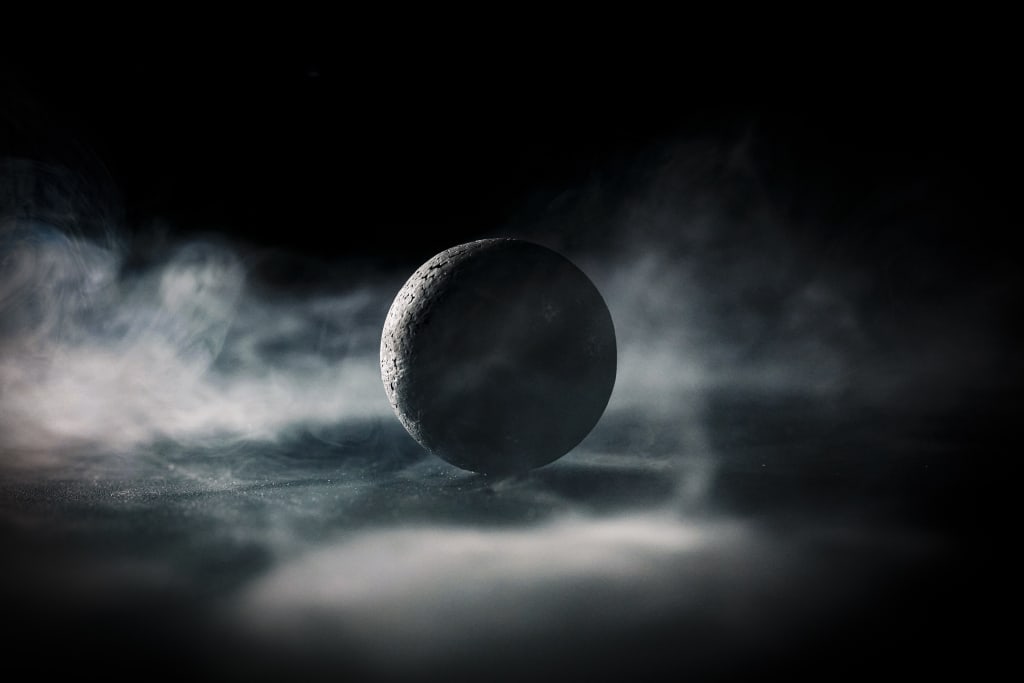
“‘Nobody can hear a scream in the vacuum of space, or so they say. It was the twelfth —’”
“That’s your first line?” Harper scowled.
Manilow looked up from the luminous page. “Yes, why?”
“Well.” Harper exhaled and turned to the glass half of the cabin. Stars razored by in lines, fading blue to red in a soundless fury of crowded light waves. His eyes, bright and alert, reflected them. He shouldn’t upset the only engineer on board. He shouldn’t tell him it’s shit.
“I think there are richer things to start with — more sensory and interesting.”
Manilow scratched his salt-and-pepper stubble, which violated facial hair guidelines. One thing at a time.
The low roar of the ship droned for a beat, and Harper continued.
“Look at what you’re wearing.” He pointed to Manilow’s hunched body, clad in a dark gray unitard. Phosphorescent cables veined along the surface, glowing in softly shifting colors. “Picture that, set against the black of endless space, as your hero flails for rescue and suffocates. Picture the viz tubes shorting out as life support drains.” Harper spread his hands. “A dramatic flicker fading into darkness.”
“It’s not endless,” Manilow moped. “Space. Remember?”
“Fine — repeating … donut or whatever the hell. You know what I mean,” Harper said.
Manilow closed his eyes. “In year 2Xb, the Collins probe irrefutably proved the known universe is constructed of —”
“That’s not my point.” Harper flared his nostrils. “Look outside.” He motioned to the brilliant tunnel of smeared stars. “No one’s seen that. Especially where we’re going.” He nodded toward the other half of the cabin, gold-plated and buffed to a dull shine. Clustered switches blinked pale pink. “Or that.”
Manilow held up a skeletal finger. “Actually, Earth Omega will technically be 3.7 years in our future. It is highly probable they will have developed similar technology.”
Harper dug for more breath. He put his blond curls in his hands, boxy jaw pulsing.
Manilow straightened up. “As we enter the next ring in the expanding series, we gain approximately 276.2 years; however, severe time dilation from our rate of travel will cause us to surrender approximately … captain?”
“Our ship is powered by a god, Manny. Your first line is shit.”
The men stared at each other, bathed in the distant thunder of unthinkable propulsion.
Manilow swatted the page aside and snorted as it dissolved. He opened his mouth but couldn’t find anything. So he stood to leave, all seven feet of him.
Harper reached for Manilow’s gloved hand, which he jerked away like it was scalded. Manilow spoke through his teeth. “I shouldn’t have come. You can’t dredge up the patience for two lines, let alone a chapter.” He stopped short of the door, a swirling white mist pressed between narrow sonic plates. “Sometimes I’m amazed you manage to wait a single second. For anything.”
He passed through the barrier and out of sight.
“That’s alright,” Harper said to the empty cabin. “Give him time to cool off.”
He raised his hand above his head and pretended to stick it through the glass, into the rushing light, letting it undulate as it rode the current. Something he had seen in the archives, something that soothed him.
Meanwhile Manilow strode down the immaculate corridor. His hi-viz suit cast its changing hues onto the light gray walls. Harper doesn’t know about literature. Or culture, or tradition. He just knows how to flash his politician smile, get people to break their backs. Prick.
The first fork split into three paths.
Left: Communications. Likely clanging with some awful ancient music as Traeger pores over The Message. She relentlessly insisted it could be fine-tuned, but the last twenty-three missions went absolutely fine. We come in peace, from past and future, universe repeats outward, here’s your fucking gift. What was left to say? Pointless.
Right: Engineering. His own office, lab, and quarters. And writing desk. Creative endeavors were discouraged but it had been a long god damn trip. And the good people of Earth Omega deserved some fresh entertainment. Who knows what they were reading, how far they had strayed. But that could wait. The captain’s words, however inaccurate, were an open wound.
Middle: Continue down the hull of The Vigilant.
Manilow continued. For a moment, he thought of tin.
The next corridor offered generous windows, out onto the nature wings. On the left, the forest. Redwoods, ferns, moss, all basking in brilliant artificial sun and churning out precious organic materials. Manilow casually considered the math behind the countless processes, and imagined numbers scrolling over the leaves, ticking away in the grass.
On the right, the freshwater lake. Its surface as still and sharp as a mirror, until a single salmon flipped into the air.
“Manny!” from behind him.
Traeger, peeking around the corner of the Comms fork, thick black braids overflowing into the hall. He could see each tooth in her floodlight smile.
Manilow gave a weak wave. “Traeger.”
“Got a sec to look over something I wrote? Just totally increased engagement by like, at least three percent! Simulation says anyway.” Her pertness was utterly untouched by Manilow’s lethargy.
For a moment, he envisioned granting Traeger’s request, sitting in the comms bay with her, and completely eviscerating every word he saw, no matter what. Watching her face dim from joy to pain.
“Not presently,” he said, and tried to muster a regretful look. He turned before he could witness her reaction.
He pushed forward, and felt slightly better. Another fork. But it didn’t matter. Manilow knew where he was going.
Left: Payload. The Gift.
Right: Lounge. Always empty.
Middle: God Engine.
A bubble appeared in front of him, text within: “Need to talk about shaving protocol. See me at the helm after dinner. H.”
Bitterly, he stepped through the pressed mist.
Despite countless visits, Manilow was not accustomed to the transition into the God Engine, nor would he ever be. His gaze helplessly fell on the enormous sphere scraping the ceiling of the cavernous space. But for Manilow — and every other human, based on the published literature — things got complicated. Like an ear hears harmony, he saw before him two distinct realities at once. They called it “asymmetric diplopia” in the journals, which was simplified to “split-vision” for the masses, and finally nicknamed “the split” in conversation.
The split remained hard to process, for even the best brains. Manilow saw the opaque containment sphere, and the bay around it, clear as day. At the same time he saw the god within, and it’s vast stellar palace, clear as day.
The sphere was dark polished carbon, spotless matte sheen. Inside were 121 subsequent spheres, each composed of a different element. They still didn’t know, really, what held the god in place. So they just did everything. All elements. Sonic fields. Radioactive barriers. Infrared webs. Herbs, spells, oils. Countless iterations of religious and pagan symbology, etched into every surface.
The god was called a god, but that didn’t mean much to Manilow, given the arbitrary parameters of language. Maybe he should put that in his book. That would be good. It was an entity, with seemingly unlimited energy, plucked from the depths of space. And as it raged in a storm of impossible holy chemistry, it propelled The Vigilant wherever they wished. Manilow suspected they could travel the total speed of light given the sheer force of the god’s constant attempt at escape, if they were willing to collapse under their own mass of course.
The god didn’t look like anything. Which was a shame, as far as his book was concerned. The closest words were light, power, time. But even those lost meaning in the shadow of this being. As Manilow stared, bleary-eyed, he decided it sort of looked like everything. It looked like when Manilow was six and his father taught him about electricity. It looked like when he was seven and his father beat the shit out of him. It looked like a fish. It looked like a galaxy the size of a freckle. It looked like the idea you are about to have. It looked like a stony bluff over a stormy sea on a Sunday five thousand years ago. It looked like the end of the movie. It looked like sex. It looked like the deep, howling pit of dissatisfaction chewing your heart away to nothing.
Most visitors to the God Engine lost consciousness, and the first ten steps into the bay were appropriately padded. Manilow held on, and wobbled toward the looming sphere.
The space was a large, insulated bay with pipes, converters, and monitors. Simultaneously, the space was an immense, gleaming energy palace littered with structures that abused the visual spectrum. In the rare moments he could focus — which became more difficult as he drew closer — Manilow was able to perceive one reality over the other. A vase, two faces.
“Give,” Manilow slurred. “Give … me something.”
The god/sphere/palace/bay did not change.
Manilow winced and fought the intoxication of the chamber. Everything seemed heavier than during previous visits. He tried to sort the sensations, press them into words he could write down later, but so much of it was blinding noise.
Tin.
The spires of the godly realm came into focus with alarming clarity, then quickly retreated to leave the ship’s dull interior. Manilow scratched down his cheek and hissed through gritted teeth. He should leave the God Engine soon. He should stay forever. He was dying. He needed a first line. He was being born.
Tin.
Manilow lumbered forward and collapsed onto the large console before the sphere. Hundreds of small readouts tracked every possible metric.
Tin.
“What the fuck?” Manilow frothed. “What the fuck is tin about? Fuck!”
Tin never did much on its own. It was mixed with copper to make bronze, at first in 5783 BCE on accident, then in 3089 BCE on purpose. In 1810, it protected the steel beneath in the first tin cans. It was mixed with cadmium, indium, and zinc for solder. It was injected into silicon to evolve ion batteries. It clung to other things to find a purpose.
Tin was the 74th layer in the collection of nested spheres built by the human race, completed 11 years ago in the vacuum of space just outside Space Station Durus, and now at rest in front of Artemis Manilow. It had taken 5 years to construct, a painfully meticulous process measured to the smallest values possible. The tin sphere — built over the osmium sphere and to be covered by the lead sphere — was sealed at the end of a long workweek, by a team of 144 of the most skilled and brilliant people on the planet. Their execution was flawless. The raw material, however, was not. An unforeseen shift in the cleanroom caused a change that was indeed detected by the atomic measurer, but fatally rounded in analysis. No one knew of the defect, nor did they know that out of the 122 layers, only one mattered, and only one could hope to imprison a god.
Manilow pushed himself up on sweaty palms. He raked his eyes over the console, which wavered in and out of his perception, increasingly replaced by swirling silver beams of the astral plane. Section I: Physical. Zone B: Elements. Static: Integrity. He dizzily scanned down the line to tin. He trembled. He coughed. He leaned, bony nose just above the surface as he examined the tiny meter. The crosshair was dead in the middle of the acceptable range.
“I don’t get it.”
Frustrated and clawing for breath, Manilow swung his heavy body from the console back toward the door, where his father stood, Manilow stood, no one stood, Harper stood, Traeger stood, the god stood.
Before it all went dark, Manilow hoped he would live, since he finally knew what to write.
About the Creator
Steve Galbreath
Writing for myself for 20 years. About time to share.
Enjoyed the story? Support the Creator.
Subscribe for free to receive all their stories in your feed. You could also pledge your support or give them a one-off tip, letting them know you appreciate their work.






Comments
There are no comments for this story
Be the first to respond and start the conversation.